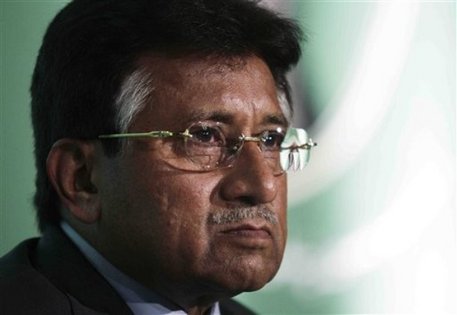
There was an interesting event yesterday on Capitol Hill with former Pakistan President Pervez Musharraf, hosted (oddly) by former Republican Senator Rick Santorum and the Ethics and Public Policy Center. The former general and former coup architect seems hellbent on a return to political leadership, and took the time to, among other things, criticize President Obama for visiting India but not Pakistan on his recent four-nation trip:
"One would have preferred that he should have gone to Pakistan to give due importance to Pakistan, which is fighting extremism and terrorism in a lead role and being a strategic partner with the US on this issue," the Daily Times quoted Musharraf, as saying.The former President further said that Obama's support of India's bid for a permanent seat on the United Nations Security Council (UNSC) would not be viewed favorably in Pakistan.
Musharraf also emphasized that the ongoing drone strikes in Pakistan risk destabilizing the country.
"I don't think Pakistan is the problem, but there is no doubt there is terrorism and extremism. The centre of gravity of all of this is Afghanistan. Pakistan is the victim of all this. We need to see Pakistan sympathetically," Musharraf said.
While he had some other critiques for India, Musharraf saved some of his toughest criticism for the question and answer period, where he bristled at our questions regarding his prior tenure - particularly those questions regarding Pakistan's Inter-Services Intelligence (ISI) agency. "Three hundred ISI operatives have died, but we think they are cooperating?" he said, without denying that much if not all of the ISI supports the Taliban. In another DC appearance, he called for slow-playing any restrictions on the radical Islamic group Lashkar-e-Taiba:
"You can't rock the boat so much that the boat capsizes," Musharraf, a military ruler who stepped down in 2008 and is attempting a political comeback, said at the Atlantic Council think-tank in Washington."While these things have to be done, allow piecemeal, gradual action through a well thought-out strategy which does not disturb the entire law and order situation in Pakistan," Musharraf said.
Musharraf acknowledged that Lashkar-e-Taiba and like-minded groups such as Jaish-e-Mohammad were "involved in terrorism in Pakistan" but said they have been "very popular" for fighting Indian rule in divided Kashmir.
"Since they were going to Kashmir and fighting the Indian army, it went along with the psyche of the people of Pakistan -- with everyone," Musharraf said.
There are certainly countries that promote men like Musharraf, and it's possible he could mount a political comeback - but so few are able to apply authoritarianism correctly, if there is such a thing. If Musharraf has no plans to push back against these internal forces, his usefulness to America seems minor at best. When nearly every Pakistan province currently has an active separatist movement, effectively turning a nation-state into a conglomeration of the ISI and a core group of Pakistani-nationalist elites, it is perhaps time to ask whether Pakistan would be better served by just becoming part of India.
In all seriousness, I also asked what Musharraf thought would happen if the Americans leave Afghanistan as scheduled in 2011. He dodged the question, maintaining that it would be a positive development as long as their goals on the ground were met. He also made sure to refer people to his Facebook page, where he has hundreds of thousands of fans.
(AP Photo)



